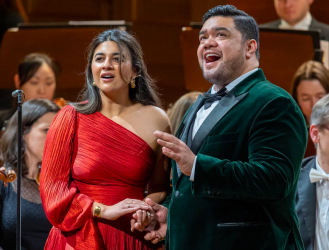 United States Various – ‘Voyages’: Amina Edris (soprano), Pene Pati (tenor), Robert Mollicone (piano). Cal Performances, Zellerbach Hall, University of California, Berkeley, 23.4.2024. (HS)
United States Various – ‘Voyages’: Amina Edris (soprano), Pene Pati (tenor), Robert Mollicone (piano). Cal Performances, Zellerbach Hall, University of California, Berkeley, 23.4.2024. (HS)

Maori Traditional – ‘Pokarekare ana’; ‘Hine e hine’; ‘Te iwi e’
Ireland – ‘Earth’s Call’
Traditional (arr. Britten) – ‘O waly, waly’; ‘The Last Rose of Summer’
Britten – ‘Seascape’ from On This Island; ‘The Choirmaster’s Burial’ from Winter Words
William Bolcom – ‘Toothbrush Time’; ‘Waitin’’; ‘Over the Piano’ from Cabaret Songs
Heggie – ‘That I Did Always Love’ from Newer Every Day
Samoan Traditional – ‘Minoi, minoi’; ‘Le Manu tagi e’
Egyptian Traditional – ‘Aatini Al Naya Wa Ghanni’; ’Ghannili Shway Giannini’
Lili Boulanger – ‘Elle était descendue au bas de la prairie’; ‘Elle est gravement gaie’; ‘Parfois, je suis triste’ from Clairières dans le ciel
Duparc – ‘La vie antérieure’; ‘L’invitation au voyage’; ‘Phidylé’
Massenet – ‘Mademoiselle . . . Nous vivrons à Paris’ from Manon
Take soprano Amina Edris and tenor Pene Pati, two opera singers with gorgeous voices, remarkable versatility, winning stage presence and charm to burn, and then let them go to work on a wide range of music with which they have personal connections. The result was an utterly radiant recital in Berkeley.
The husband-and-wife team has won a strong following across the Bay Bridge at San Francisco Opera. Most recently, Edris sang Cleopatra in the 2022 world premiere of John Adams’s Antony and Cleopatra, and Pati sang Nemorino in a terrific The Elixir of Love in November. Both have found success around the opera world.
Here they took the audience on a personal tour of music from places they have lived. Entitled ‘Voyages’ (pronounced as the French do because they currently reside in Paris to focus on European opera houses), the musical stop-offs began with Maori songs, as both are New Zealanders, and touched on tenor Pati’s family origins in Samoa and soprano Edris’s in Egypt. They embraced art songs from England (where they both studied) and the United States (where they first burst onto the classical music scene) en route to France for both art song and opera.
Two Maori songs that New Zealand soprano Kiri Te Kanawa liked to include in her recitals, the lyrical ‘Pokarekare ana’ and the sweet lullaby ‘Hine e hine’, started things off, with Pati accompanying on guitar (and singing in harmony). Pianist Robert Mollicone, with whom the couple worked at San Francisco Opera, provided idiomatic accompaniments in all the varied musical styles, beginning with the bumptious, haka-infused ‘Te iwi e’ that completed the Maori set.
Edris began the U.K. segment by singing John Ireland’s pungent ‘Earth’s Call’ with rich tone and gravitas. Pati then delivered a set of Britten songs with an ease and vocal personality that somehow reminded me of bass-baritone Bryn Terfel’s conversational singing style, especially in ‘Seascape’ and its offhand description of a seaside scene.
A set of cabaret songs by American composer William Bolcom gave Edris a golden chance to show off a different side of her singing and acting chops. The yin and tang of being alone in ‘Toothbrush Time’ found her turning here and there for a fine effect. The jazzy texture of ‘Waitin’’ brought out a bluesy atmosphere and, in the sexy ‘Over the Piano’, she literally sang songs leaning on the piano and, eventually, over the pianist. It was a tour-de-force.
Pati returned for a stately rendering of Jake Heggie’s rueful ‘That I Did Always Love’, before returning with a ukulele to accompany himself in a song his Samoan mother sang to him, ‘Minoi, minoi’ (‘Move, Move’). He used a full-size guitar for another Samoan tune, ‘Le Manu tagi e’ (‘The Weeping Bird’). Edris returned with oud-player Ala K. for two sinuous, exotic Arabic songs that she often sang with an uncle growing up. The melodic turns on Oum Khutum’s ‘Ghannili Shway Shway’ were especially fragrant.
Turning toward France, Pati found just the right tone for the sensitively descriptive poetry and delicately phrased music in a set of three Lili Boulanger chansons from the early twentieth century. Edris’s evocative singing and lustrous tone then captured the beauty of three Romantic-era Duparc songs, especially in the oft-heard and shamelessly lush ‘Phidylé’.
The Act I duet from Massenet’s Manon topped off the program with realistic buoyancy in both acting and singing. One could feel the trepidation as the characters flirt and eventually decide to go to Paris together – something, of course, that they did. Musically, the buildup to the duet’s climax and the resonant high notes was nothing short of thrilling.
As an encore, another soprano-tenor ‘meet-cute’ duet delivered even more impressive singing in ‘Nuit d’hyménée’ – the balcony-scene duet from Gounod’s Roméo et Juliette.
Harvey Steiman
